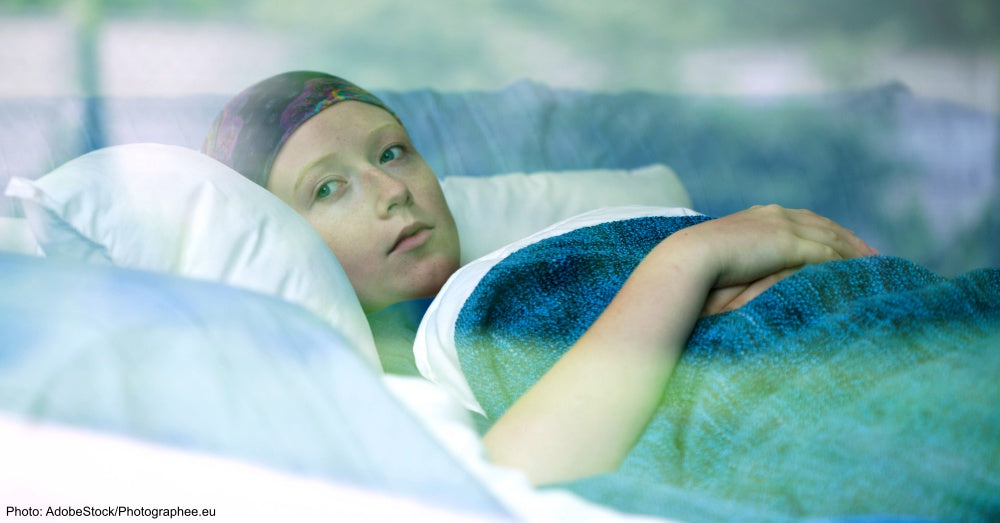Cancer Changes A Person's Perspective On Life And It Can Lead To Loneliness
Katie Taylor
Probably everyone has experienced loneliness at some point in their lives. Feeling isolated is not only emotionally draining, but it can be damaging to our health. Loneliness can be as negative to our health as smoking.
But loneliness is not like smoking. It's not a habit that you pick up from friends, and there's no nicotine patch for loneliness. And for those dealing with cancer, loneliness may be especially hard to avoid.
A cancer diagnosis is scary, and it may be intimidating for the friends and family of the cancer patient. People may not know what to say or how to help, and so some will find it easier to simply pull back from the relationship. Even spouses may withdraw in a subconscious effort to protect themselves from the pain of possible loss.
 Photo: AdobeStock/dundanim
Photo: AdobeStock/dundanim
And cancer sends a person to a unique place—suddenly everyday matters seem unimportant when forced to consider your own mortality. Cancer tends to focus a person on what's truly important, and that may mean that relationships that worked before cancer no longer work during or after cancer. Sometimes even a marriage relationship won't survive because of how a person changes during a cancer journey.
The physical pain and strain of treatment may make someone feel like their friends and family can't understand what they're going through, and it's likely true. Radiation, chemotherapy, surgery, or whatever treatment a person is prescribed will be extremely difficult, and not having people around who understand is isolating. Well-meaning friends may be eager to share stories that the person dealing with cancer may not find relevant, and listening to those stories can be exhausting. It may be easier for a cancer patient to be alone than attempt small-talk with people who simply don't understand what they're going through.
From a practical perspective, cancer treatment may leave little time for a social life. And when a person is not in the hospital, they may be too exhausted to participate in their usual hobbies or social engagements. Side effects like nausea, fatigue, and diarrhea can make even short visits a challenge.
 Photo: AdobeStock/Johan Larson
Photo: AdobeStock/Johan Larson
So while many people diagnosed with cancer report wonderful outpourings of love and support from friends and family, others can feel extremely isolated and alone. It's possible for someone to feel both at different times during their journey.
Dr. Lidia Schapira, oncologist, talks about the marital challenges someone may face after surviving cancer treatment. She says, "The spouse who had cancer often cannot ‘snap back’ to pre-cancer mode. She or he may still be dealing with lingering physical or emotional effects and may, in some ways, not be exactly the ‘same person’ as before... " Certainly this would affect other relationships as well. If a cancer survivor has made it through cancer and reevaluated what's important in their lives, they may no longer meet the expectations of their friends, and their friends may not know how to respond.
So during and after one of the hardest times of their lives, someone dealing with cancer may find their support circle shrinking.
 Photo: AdobeStock/natalielb
Photo: AdobeStock/natalielb
What does loneliness do to our health?
At a very basic level, we have a need for connection. According to Dr. Cacioppo, "We're a fundamentally social species, and a social animal that is isolated is almost certain to live a shorter, more miserable life." Before modern times (and arguably still today), human beings needed to work together to survive. Being alone was dangerous. When we feel alone, we receive the same signals in our brain as we do when we are in physical danger. Chronically lonely people have higher levels of stress hormones, and this affects their day-to-day life and their ability to fight disease.
Those who are lonely experience less restorative sleep, increased negativity, depressive thinking, and heightened sensitivity to social threats. The stress of being lonely depletes a person's mental capacity to interact positively with their surroundings. When their basic need of connection is not being met, people move into survival mode and are less able to respond appropriately to social situations and control impulses. Loneliness is supposed to motivate us to care for ourselves, but if our needs aren't met our loneliness will grow worse.
 Photo: AdobeStock/pololia
Photo: AdobeStock/pololia
How Exactly Do We Define Loneliness?
Dr. John Cacioppo, director for the Center of Cognitive and Social Neuroscience at the University of Chicago, defines loneliness as perceived social isolation. You can feel lonely in a crowd because someone feels lonely when they perceive that others around them are a threat rather than a source of help and support. A lonely person will worry more about their social interactions and be more likely to view those interactions as negative.
Cancer patients are especially susceptible to this because of worries over how people will react to their cancer diagnosis. Stressing about social interactions can lead to avoidance, which of course exacerbates loneliness, and the cycle continues.
Once a person is in a lonely state of mind, it can be hard to break free. A person's loneliness can make them misinterpret the well-intended actions of others, reinforcing their perceptions of being rejected or judged. Loneliness easily becomes a self-defeating cycle.
 Photo: AdobeStock/Antonioguillem
Photo: AdobeStock/Antonioguillem
What can be done to overcome loneliness?
Understanding the effects of loneliness is helpful on the road to acceptance, but perhaps less helpful when trying to figure out what to actually do about it. While there is no shortage of internet lists on how to make friends, addressing loneliness at its core, especially for a cancer patient, takes more than signing up for a Zumba class or scheduling a dinner date. How can you truly break a self-defeating cycle?
Dr. Leslie Becker-Phelps, a licensed psychologist, cites three steps for overcoming loneliness: awareness, acceptance, and compassion.
 Photo: AdobeStock/Jacob Lund
Photo: AdobeStock/Jacob Lund
Awareness allows us to recognize our negative thinking. A lonely person cannot address their loneliness if they don't first admit to it. Then the hard work of changing thought patterns can begin. Dr. Cacioppo writes, "The simple realization that we are not passive victims, that we do have some control, and that we can change our situation by changing our thoughts... can have a surprisingly empowering effect."
Still, it's hard work to change thoughts, and it's scary. A lonely person will need to reach out to others, and assume a positive, non-threatening interaction even though they tend to feel threatened and left out. This is a daunting task, but positive thinking is key to not only working through loneliness, but making it through cancer treatment.
 Photo: AdobeStock/ashtproductions
Photo: AdobeStock/ashtproductions
Toby Dauber, a licensed social working who works with patients dealing with chronic illness, encourages patients to embrace things that bring them joy and gratitude. She recommends accepting how you feel rather than ignoring it or trying to distract yourself, and then look to the future. "Remember what makes you happy, joyful and positive. You don’t have to stay stuck in this place."
Cancer patients and survivors should also consider a cancer support group. Sharing stories with people that understand the physical and emotional strain of cancer can be uniquely restorative. In a support group, someone can openly share their fears about chemo, relapse, and scarring and find support from others who have the same fears.
The knowledge that there are others who have gone through a similar experience is deeply encouraging, and cancer patients often feel they can connect with other cancer patients more deeply and easily than they would have imagined. So while cancer can strain some relationships, it can make others possible. It takes work to reach out and form those relationships, but they may end up being deeper and more meaningful than any you've had before.
 Photo: AdobeStock/Rawpixel.com
Photo: AdobeStock/Rawpixel.com
Dr. Becker-Phelps' last recommendation, to embrace compassion, may be the hardest. We must both care for others and accept that we deserve to be cared for. If you have people that you can reach out to, do so. Make the effort to find a support group, or even a therapist. And in-person interactions are best—get offline and interact with a human face.
Facing loneliness takes courage. Treat yourself with kindness and remember that many people feel lonely, and everyone who feels lonely deserves compassion and companionship. Face your challenges one day at a time, and celebrate every success. Keep fighting, friends!


